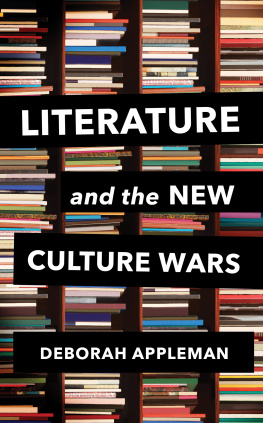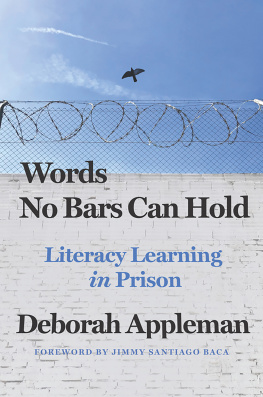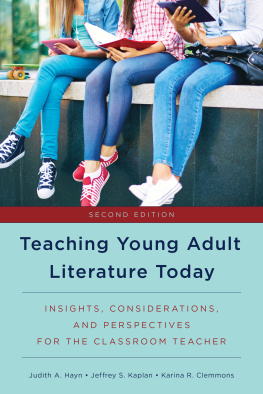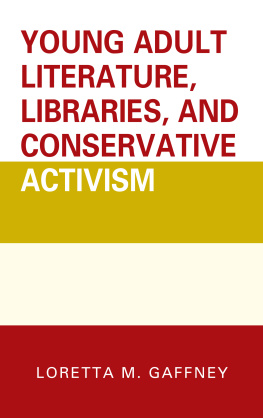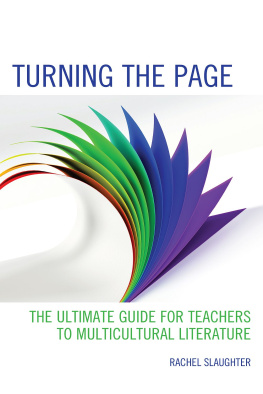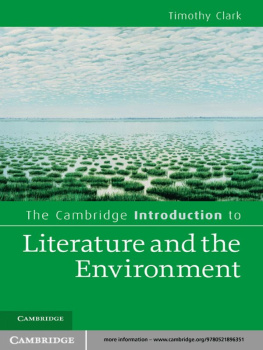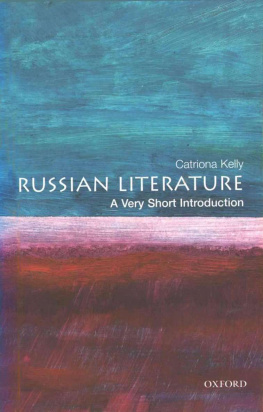Contents
Page-list
Guide

Advance Praise
Now more than ever, educators need to feel encouraged and empowered to teach literature that reflects what is happening in the world today, that acknowledges and reckons with the past, and that enlivens hope for an equitable and just future. Literature and the New Culture Wars is the book that honors and makes visible those educators doing this necessary work.
Marcelle Haddix, Associate Provost for Strategic Initiatives, Syracuse University
Finding the vocabularyneither offensive nor defensiveto confront book challenges has never been more difficult than today. Enter Deborah Appleman. With extraordinary candor, she models the kind of intellectual rigor that teachers and school leaders need to employ when complaints converge from both the right and the left. You need this book and need it now.
Carol Jago, High school English teacher, past president of the National Council of Teachers of English, and author of Th e Book in Question: Why and How Reading Is in Crisis
If I could buy just one book for every English teacher in America at this time, it would this one. Everything Deborah Appleman has written and thought about in the past would seem to have been in preparation for this moment in time, so that she would be ready to write this book about our profession, our country, and our place as English teachers in these difficult and, at times, even dangerous conversations. Appleman brings us all, whatever our perspective or place on the political spectrum, to the table and helps us have the conversation we so badly need to have about our work, our schools, our communities, and our country. The fact that she manages to also fit in, at the end of each chapter, practical suggestions about how to apply the ideas she discusses to our own classrooms and curriculum makes this book all the more of a blessing, for so often we are often left with the question, after discussing many of these issues for the umpteenth time with colleagues or reading such a book, Yes, but what should I do in my classroom tomorrow? Drawing on her remarkable career as a classroom teacher, scholar, literacy leader, activist, and author, Deborah Appleman shows us the way forward that I have been looking for and am so grateful to find in this book.
Jim Burke, Middle College High School, San Mateo, CA, and author of Th e English Teachers Companion (Heinemann) and Uncharted Territory (W. W. Norton)
Deborah Appleman is one of the legendary mentors of our profession. Her latest and perhaps most courageous book arrives at the right moment to rescue literary education in American schools from the anti-literate, parochial, and self-righteous censors from across the political spectrum, who dont begin to understand that the function of literature is to awaken our sense of outrage and empathy, trouble our platitudes, and arouse us to moral action.
Sheridan Blau, PhD, Professor of Practice in the Teaching of English, Teachers College, Columbia University
Appleman brings a wealth of knowledge as an academic, instructor, researcher, teacher, and social activist to her writing about the current cultural wars focused on book banning, canonical texts, #MeToo, and trigger warnings. She includes definitions of terms and contextualizes their use and potential for pedagogical decision-making. She also deconstructs ill-conceived narratives by describing how tensions within politics and society can affect the teaching of literature. Eschewing oppositional binaries, she encourages teachers and instructors to draw upon academic freedom in support of students agency, emerging critical consciousnesses, and personal freedoms. Her book is inspired by a variety of authors, historians, scholars, and teachers.
This book seeks to provide a balanced discussion of why, and how, past and contemporary manifestations of historical, political, and social concerns can affect the teaching of literature. Appleman supports addressing and explicating the lack of diversity, equity, and inclusion in heteronormative, white-centric, canonical literature, and mentions the voiced and unvoiced discomfort expressed by some readers and teachers who wish to retain the status quo. The decentering of whiteness and the unlearning of white supremacy requires centering BIPOC cultures, experiences, histories, languages, and racial/ethnic communities in literature as worthy and valuable. Appleman also provides alternative instructional approaches and strategies to use in classrooms.
Arlette Ingram Willis, professor, University of Illinois
Norton Books in Education
LITERATURE and the
NEW CULTURE WARS
TRIGGERS, CANCEL CULTURE,
AND THE TEACHERS DILEMMA
Deborah Appleman

This work is intended as a general information resource for educators. It is not a substitute for appropriate professional education or training. Standards of clinical practice and protocol change over time, and no technique or recommendation is guaranteed to be effective in all circumstances.
As of press time, the URLs displayed in this book link or refer to existing websites. The publisher is not responsible for, and should not be deemed to endorse or recommend, any website other than its own or any content available on the Internet or elsewhere, including, without limitation, any app, website, blog page, or information page, that the publisher did not create. The author also is not responsible for any material that the author did not create.
Stuck In Th e Middle With You
Words and Music by Gerry Rafferty and Joe Egan
Copyright 1973; Renewed 2005 Stage Three Music (Catalogues) Limited and Baby Bun Music Ltd.
All Rights for Stage Three Music (Catalogues) Limited Administered by BMG Rights Management (US) LLC
All Rights Reserved Used by Permission
Reprinted by Permission of Hal Leonard LLC
Excerpt(s) from BREAKING BREAD WITH THE DEAD: A READERS GUIDE TO A MORE TRANQUIL MIND by Alan Jacobs, copyright 2020 by Alan Jacobs. Used by permission of Penguin Books, an imprint of Penguin Publishing Group, a division of Penguin Random House LLC. All rights reserved.
Copyright 2022 by Deborah Appleman
All rights reserved
For information about permission to reproduce selections from this book, write to Permissions, W. W. Norton & Company, Inc., 500 Fifth Avenue, New York, NY 10110
For information about special discounts for bulk purchases, please contact W. W. Norton Special Sales at specialsales@wwnorton.com or 800-233-4830
Jacket design by Lauren Graessle
Jacket art luoman / Getty Images
Author photo Sara Rubinstein
Library of Congress Cataloging-in-Publication Data is available
ISBN: 978-1-324-01918-3
ISBN: 978-1-324-01919-0 (ebk.)
W. W. Norton & Company, Inc., 500 Fifth Avenue, New York, N.Y. 10110
www.wwnorton.com
W. W. Norton & Company Ltd., 15 Carlisle Street, London W1D 3BS
For Mike Rose, whose memory is a blessing
CONTENTS
First and foremost, thank you to Carol Chambers Collins, who saw the possibilities of this book before I did.
Thank you to the high school teachers who continue to inspire and to push me, especially the ELA teachers at South High School and Henry High School in Minneapolis, Minnesota. You know who you are!
Thank you to John Schmit, whose patience and wisdom tempers me at every turn.
Thank you to Jeffrey Snyder and Amna Khalid, whose work encouraged my thinking.

